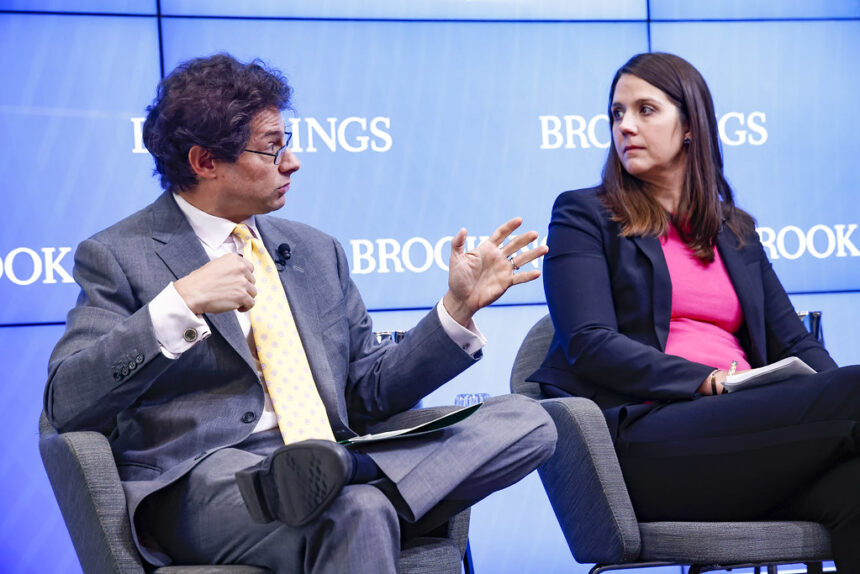US Securities and Exchange Commission Chair Gary Gensler and all five SEC Commissioners faced harsh criticism during a hearing before Congress focused on the agency’s approach to cryptocurrency regulations.
Both sides of the aisle have expressed concern over the SEC’s aggressive enforcement of digital assets. They questioned its lack of regulatory transparency and called for a more structured approach.
This hearing comes amid a growing frustration within the crypto industry about what many perceive as an “scorched-earth” approach by SEC.
During the hearing Gensler was joined by Hester Peirce and Caroline Crenshaw.
SEC criticised by lawmakers for creating policy uncertainty
The SEC spoke for the first time since 2019 about crypto oversight to the US House Financial Services Committee.
Many lawmakers argued that Gensler’s hardline stance had stifled the innovation in the emerging digital assets sector.
Gensler, a man who has repeatedly said that most cryptocurrencies are securities, was grilled on the lack of guidelines for blockchain-based currencies such as Ethereum.
#WATCH: Chairman @PatrickMcHenry at today’s hearing to conduct oversight of the @SECGov: “Chair Gensler’s legacy will be defined by turning the once proud institution of the SEC into a rogue agency.” Read more financialservices.house.gov/news/documents… Watch his opening remarks
View all replies
Hester Peirce echoed the concerns of these commissioners, who are often a dissenting voices within the SEC.
She said that the SEC failed to provide regulatory clarity to the crypto industry, despite the fact that it had the tools to do so.
Peirce argues that the use of ambiguous terminology, such as suggesting that all crypto tokens were securities, has added confusion and undermined the agency’s capacity to effectively oversee the marketplace.
Representative French Hill backed Peirce’s position. He argued that the SEC had “front-run Congress on crypto regulation”, by enforcing broad enforcement actions, without a comprehensive regulatory framework.
Hill and Peirce emphasized the need for Congress’s intervention with statutory guidelines which could establish clearer regulatory borders, especially given the SEC’s reluctance in engaging in rulemaking.
‘Rogue SEC’
The phrase “rogue SEC”, which was used repeatedly throughout the hearing to highlight lawmakers’ frustration over the commission’s handling digital assets, was repeated several times.
Representative Tom Emmer was one of the most pointed participants, criticizing Gensler’s use of the term “crypto-asset security,” a term that the SEC has since retracted. It has also promised to not use it in future legal proceedings.
Emmer’s remarks have further highlighted the confusion surrounding the SEC’s crypto stance.
The hearing also brought to light the ongoing debate about stablecoin regulation.
Maxine Waters, ranking member of the committee, urged Patrick McHenry that negotiations on stablecoin policy should be finalized before 2024.
Both parties have been in talks for months about regulations for fiat pegged tokens. Many industry experts believe that such a bill would have a far-reaching effect on the global digital market.
The hearing was held after a committee meeting entitled “Dazed & Confused: Breaking down the SEC’s Politicized approach to Digital Assets”, during which Gensler received similar criticisms.
Dan Gallagher is a former SEC Commissioner and Chief Legal Officer of Robinhood. He testified in court that the SEC staff was largely unresponsive to Robinhood’s request to register as a virtual asset exchange. This reflects the larger concerns about the SEC’s handling crypto oversight.
Before the hearing, Republican legislators, led by Committee chair McHenry pressed the SEC, and other regulatory agencies, including the Federal Reserve, and the Federal Deposit Insurance Corporation to retract Staff Accounting Bulletin 121.
#NEW: Before today’s hearing, Chairman Patrick McHenry and Reps French Hill, Huizenga and Barr sent letters to @FDICgov and @USOCC and @SECGov, demanding that they produce interagency communication regarding SAB 121. Read more financialservices.house.gov/news/documents…
The bulletin is not an official SEC interpretation but has caused controversy because of reports of private meetings held between SEC staff members and certain companies. This led to accusations of favoritism on the competitive digital asset custodial market.
A key issue was whether Bank of New York Mellon – the largest custodial US bank – had received preferential treatment as a result of SAB 121. Critics claim that the SEC lacks transparency in making such decisions, which has led to an unfair playing field for crypto companies.
Gensler will continue to defend the SEC in future hearings. However, his next scheduled appearance before the Senate Banking Committee was postponed.
The pressure on Gensler to clarify the SEC’s approach to digital assets will only intensify over the next few months.
This post Congress grills SEC chair Gensler about crypto oversight and regulatory approaches may be modified as new developments unfold.
This site is for entertainment only. Click here to read more






